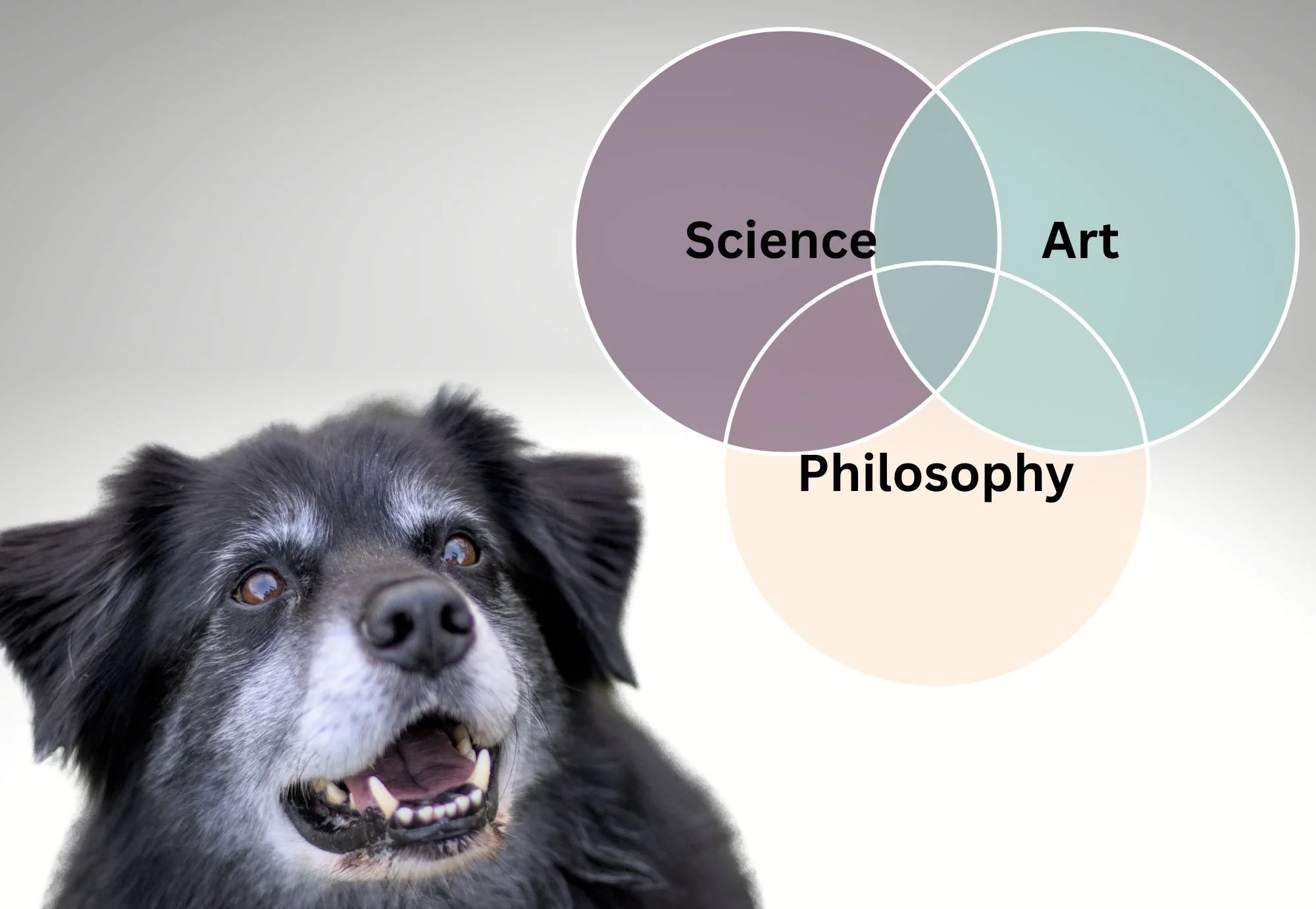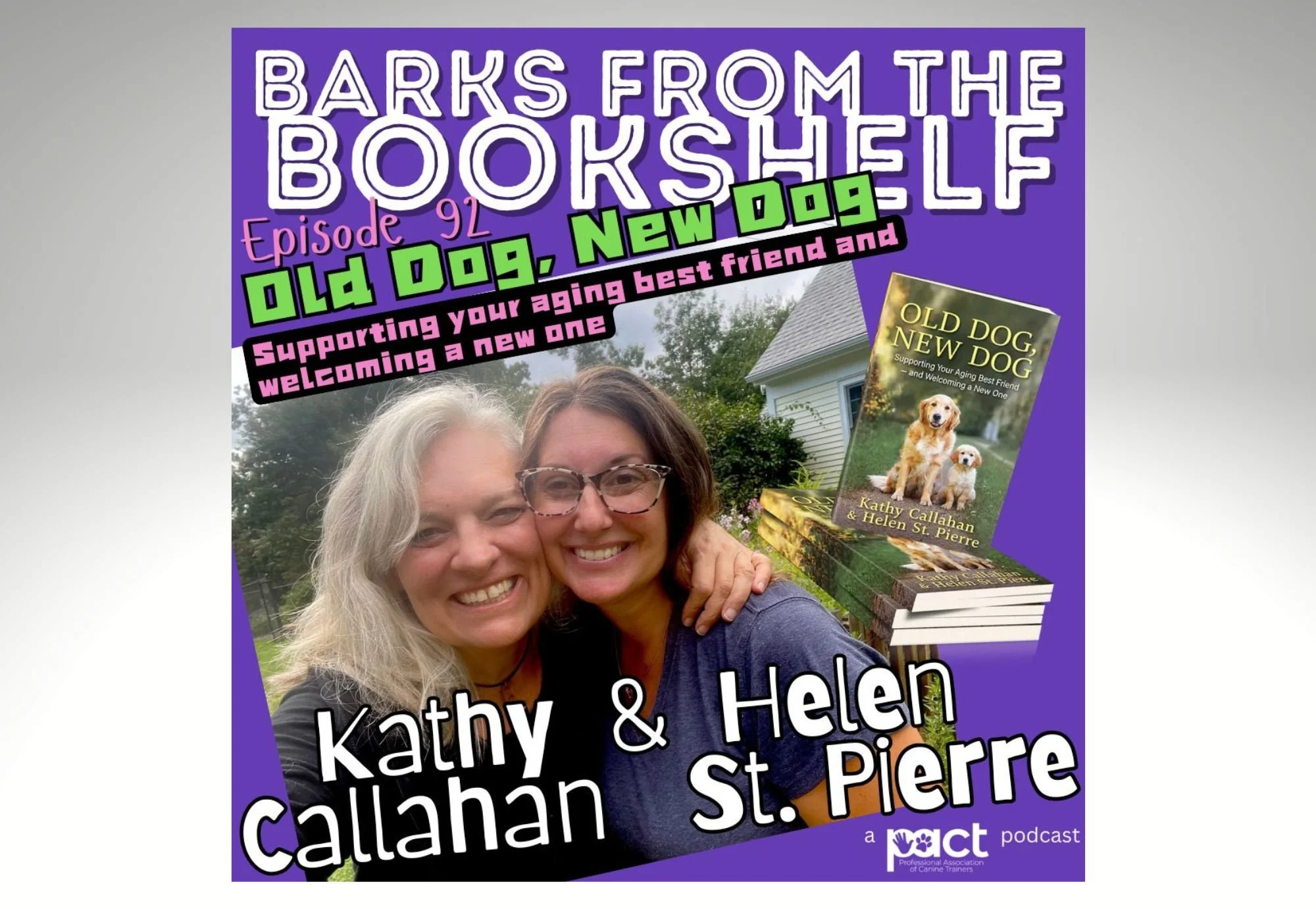They Are The Teachers
So I’ve been in a weirdly philosophical mood recently. Perhaps it’s been down to talking to and being influenced by some incredible people? Perhaps it’s a reaction to the ever toxic online environment we find our industry in, and the general news infiltrating our phones on the daily? Perhaps (and this is more likely) it’s more to do with me edging. Ever closer, towards my fifties. Whatever the reason I find myself looking more and more to understand co-existing with dogs through different lenses.
Bear with me… I haven’t quite booked a year’s silent retreat in Tibet (yet) but, I am finding it fascinating to explore where the science, philosophy and even art cross over in the “Ven diagram” of living/working with another species.
I don’t think it’ll come as a surprise to most that dog training is undoubtably a blend of science, art, and philosophy. The science is in understanding how dogs learn, what motivates them, and the principles of behaviour. The art is in the creativity, timing, feel, and intuition you develop with a dog. The philosophy is in the thoughtful approach we take to our relationships.
When you start dipping your toes into popular approaches from different fields—like Science, Stoicism, Buddhism, Jungian psychology, and Neuroscience—you notice they all offer valuable lessons for living with dogs. What intrigues me further is just how many shine a light on similar aspects, but from slightly different angles. One of the striking similarities is that they all provide a timely reminder of how to work with and live alongside our dogs more effectively and harmoniously. This has led me to try and eek out some of that and write a bit about it. I’m far from an expert on any of this BUT, sometimes inspiration is the key to opening more doors. So here is the first in a little series I plan to write and I hope you find it as interesting as I have.
This piece was inspired by a recent conversations I’ve had with Kathy Callahan, Helen St. Pierre, Jennifer Zeligs. If I’m being honest I can’t see myself giving myself over completely to any big philosophies BUT I do see the merit in exploring ideas and building a toolkit that will help us all live more harmonious and less stressful lives (with and without our canine partners in mind). So to start I thought I’d explore what these lenses could tell us about dealing with the inevitable. The loss of our dogs.
They are the teachers
There is a final, unavoidable lesson that every dog, or animal we share our lives with, teaches us: the lesson of impermanence. Their lives burn bright, beautiful, brilliant, and tragically short. To love a dog is to open ourselves to the certainty of profound grief. This alone is something to ponder on as us human animals tend to struggle with vulnerability. And it’s in this, I think it’s fair to say, we find their ultimate teaching.
People like Jenifer Zeligs, who exude a calm, caring authority and who really think before they speak (something I hope to learn before I die) are pretty inspiring. That inspiration led me to explore what Buddhism might have to say about this ultimate teaching. Turns out Buddhism is founded on four “Noble Truths” and the first of these speaks to how life involves suffering and how that suffering is often rooted in our attachment to things that are impermanent. Our relationship with our dogs is perhaps the most potent and concentrated course in this subject we will ever take. We know, from the very first day, that our time is limited. This knowledge can be, if you’re anything like me, a source of constant, low-grade anxiety. Yet if we reframe it, flip it on its head, it could be a catalyst for a type of wonderful radical presence with our dogs.
Another appealing philosophy for me is Stoicism. This was all the rave back in ancient Greece and still popular today. The Stoics had a practice for that radical presence known as “Memento Mori”, remember you will die. It was not a morbid obsession, but a tool to infuse life with meaning and urgency. Our canine companions are a living, breathing memento mori. They remind us to be radically present. That this walk, this cuddle, this moment of shared silence is precious precisely because it is fleeting. A recent interview I had with Kathy Callahan and Helen St. Pierre really brought this idea home to me. Their new book “Old Dog, New dog” is not only a fabulous guide book for when looking to introduce a new puppy to an existing senior dog but, a reminder of how we should be present, gentle, thankful and adaptable to the wonderful senior dogs we share our lives with. Helen and Kathy’s writing on how we should prepare for the inevitable was heartfelt, raw and a timely reminder that each day is a gift (to listen to that episode click on the button at the end of this blog).
When the end comes, that pain can be overwhelming. Neuroscience explores this concept through research on attachment, social loss, and grief, describing it as the “severing of one of the most powerful oxytocin-driven attachment bonds we can form”. The grief is not 'just for a dog'; it is a real, physiological, and psychological wound.
Yet, perhaps it's in this moment of shattering loss that we can truly begin to understand the profound lessons our dogs have taught us. We learn to love completely but hold lightly, recognising that the depth of our grief is simply a measure of our love—a price we willingly pay for such a wild and beautiful ride.
For those of us who work with animals, we get to witness this story play out many times, and in doing so, we might even be able to help others navigate the complex feelings of anticipatory grief and eventual loss. Our role is to celebrate the human-animal bond in its entirety, from its brilliant beginning to its gentle end.
Ultimately, us human animals, are hardwired to seek control, but we cannot control the length of their lives. We can only look to influence the quality of the life we give them and the grace with which we let them go. Their final lesson is never in their dying, but in how their life taught us to live. They show us how to love unconditionally, find joy in simplicity, forgive quickly, and be utterly, unapologetically, and radically present. And in their passing, they teach us possibly the two most important lessons of all, to hold the profound pain of loss in one hand and the immense gratitude for their existence in the other.





